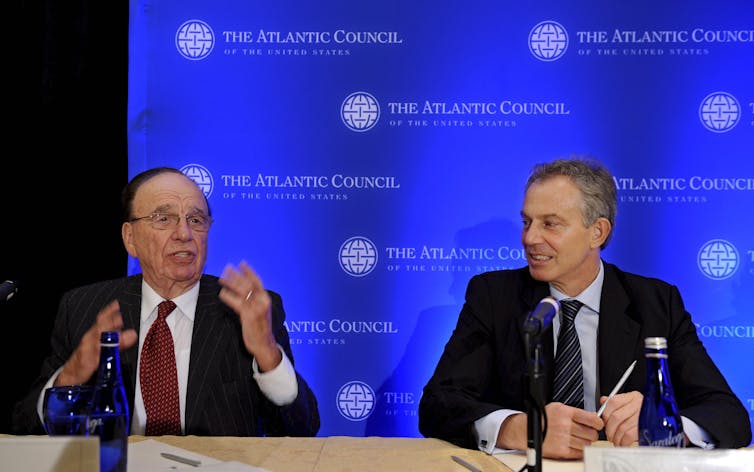Leaving it as late as editorially possible, the Sun has endorsed Labour. With an election day front page saying it’s “time for a change”, the Murdoch-owned tabloid says the Conservatives “have become a divided rabble, more interested in fighting themselves than running the country”.
Mere weeks ago, the former Sun editor Kelvin Mackenzie told the Independent that it would be “absolutely shocking” if Rupert Murdoch allowed any of his newspapers to endorse Keir Starmer. He must have been surprised then, when the Sunday Times announced its decision to back the Labour party, which it hasn’t done since 2005.
Sunday’s editorial stated:
We cannot go on as we are, and we believe it is now the right time for Labour to be entrusted with restoring competence to government … The exhausted Conservatives are neither up to it nor up for it. There comes a time when change is the only option.
The endorsement was tempered, saying that the Tories have “forfeited the right to govern” and now must regroup, with Labour the only option to take the reins. This is hardly a full-throated endorsement of Starmer.
It was also not much of a shock. While the newspaper, along with its sibling titles, was consistently and virulently anti-Jeremy Corbyn, it should be remembered that the Sunday Times, the Times and the Sun all supported Tony Blair on the eve of Labour’s 1997 landslide election victory, and again in 2001.
The Sun’s endorsement is a much bigger deal for Starmer. Indeed, the Labour leader has enjoyed the backing of a number of publications known for endorsing the Conservatives, including the Financial Times and the Economist.
Rupert Murdoch is nothing if not pragmatic and reportedly hates losing, so it is not surprising that the paper came out for Starmer, given the widely predicted Labour victory. As former editor Stuart Higgins told the BBC: “The Sun wants to be on the winning side.”
Starmer and The Sun
But the endorsement, in addition to being days behind other papers’, isn’t exactly enthusiastic, nor is it the self-congratulatory fanfare of the Sun of 1997.
Like the Sunday Times, the Sun backs Labour as a last resort, describing Reform as a “one-man band” and the Lib Dems as “a joke”. The paper praises Starmer for distancing his party from the Corbynite left, for his backing of Ukraine and Israel and for the party’s commitment to “turbo-boost” economic growth.
But it notes Starmer “has a mountain to climb, with a disillusioned electorate and low approval ratings”, and takes aim at his immigration approach (“do not have a clear plan”) and the possibility that taxes will rise under Labour.
Starmer has long had a fraught relationship with Murdoch and his media entities. It is far colder than the mogul’s more-than-friendly relationship with Blair, who became godfather to Murdoch’s daughter Grace in 2010.
Starmer was director of public prosecutions in 2011 and was ultimately in charge of accusing 29 Sun and News of the World reporters of criminality during the phone-hacking scandal. As Mackenzie said: “Most of the journalists were cleared but they still had their lives damaged or destroyed.”
This is something the Sun appears not to have forgotten. In January of this year it published a story on Starmer’s legal past, accusing him of working “for free as a lawyer to help scores of twisted killers around the world”. As a criminal defence lawyer specialising in human rights, Starmer defended many people facing a death sentence for violent crimes.
The paper dubbed Starmer “Sir Softie”, as in, soft on crime and criminals. An editorial earlier this week attacked Labour’s perceived shortcomings on immigration, stating that the party would hand “an effective amnesty to tens of thousands of illegal migrants”.

The last-minute endorsement shows that, as with other tabloids, the Sun never had as much political power as it likes to boast, in the sense that it influenced voter behaviour. Murdoch has always had an ear for the zeitgeist and his papers have backed whichever party he believes will win.
The Sun’s 2015 election website Sun Nation was as bombastic as you might imagine, proclaiming: “From Maggie’s win in 1979, to Kinnock’s defeat in 1992, and Tony Blair’s 1997 victory, our iconic front pages have literally written history.”
Nearly three decades later, the power of the press is waning. If Labour gains a big enough majority, it may (and should) feel emboldened enough to govern without continually reflecting on what the Murdoch media may think. Perhaps Starmer will pay heed to the regretful feelings of Tony Blair, expressed in 2007: “We paid inordinate attention in the early days of New Labour to courting, assuaging and persuading the media.”

